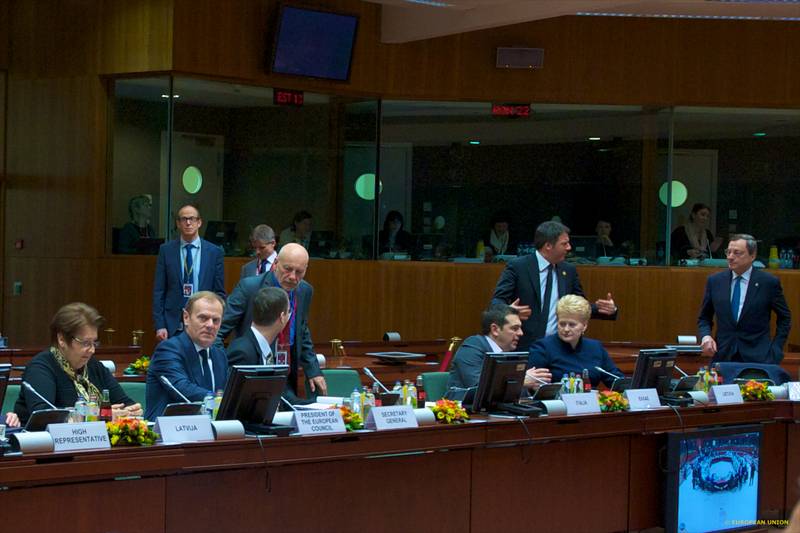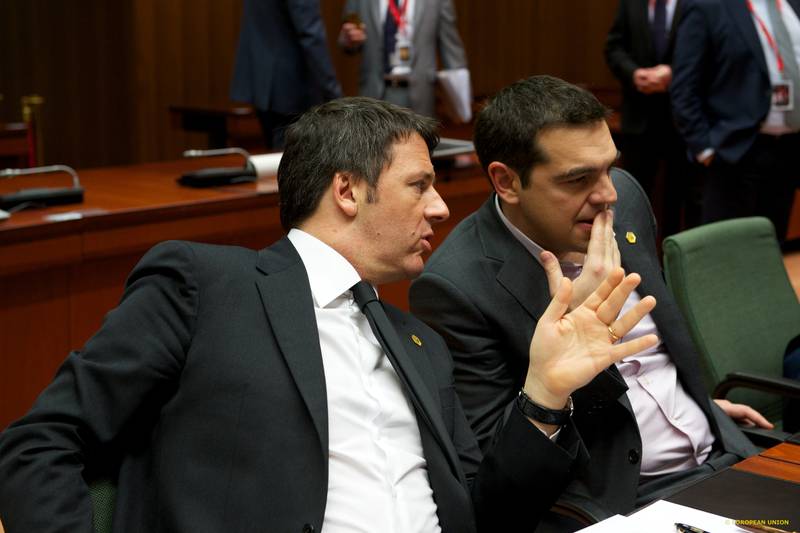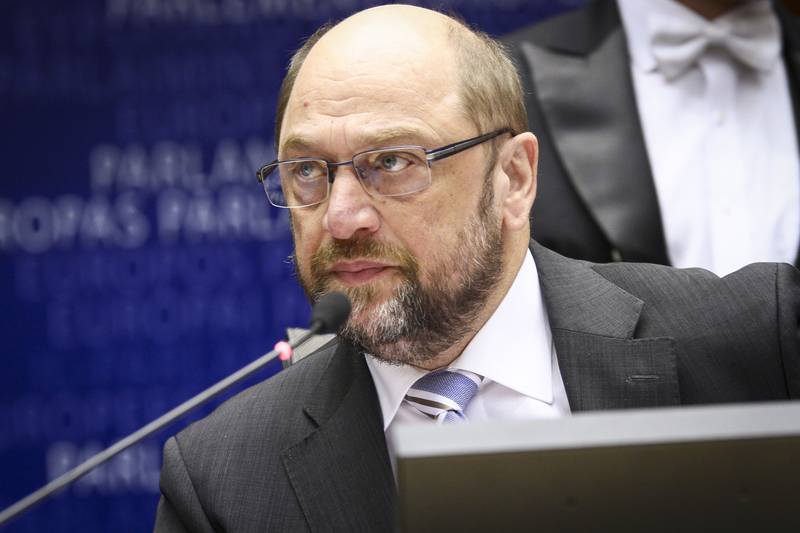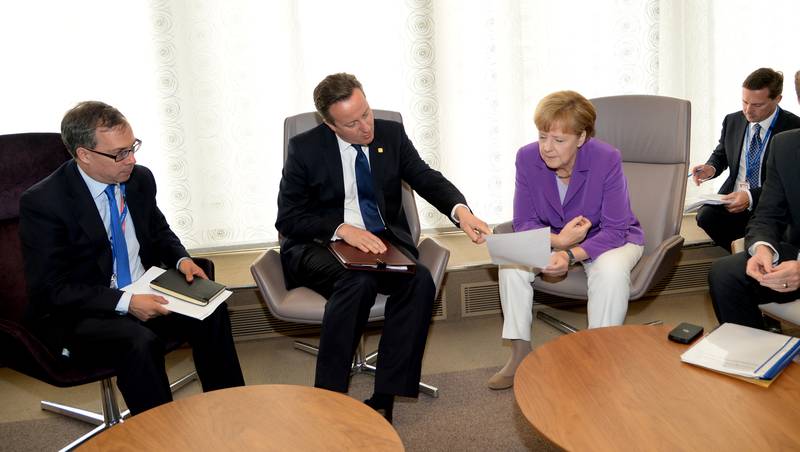European Semester Is Slowly Dying
Adelina Marini, March 31, 2015
 The largest and boldest reform of the EU after the Lisbon treaty - the Union's economic governance - is headed toward a complete failure. Of this speak the in-depth economic reviews of the European Commission presented earlier this year - on 25 February. These reports show something that has been known quite well for more than a year - the member states do not implement the country-specific recommendations. Nonetheless, instead of heavily criticising the Council for loss of credit of the agreed with huge institutional pain new rules, the Commission did quite the opposite - it sacrificed the rules to the investment plan by loosening the grip for the country which has for years refused to abide by the rules - France - mainly because it decided to participate with additional money in the investment fund. The issue of the European semester and the investment plan was a major one on the second day of the spring European Council on 19-20 March but the conclusions of the leaders show that they have no intention to change the status quo.
The largest and boldest reform of the EU after the Lisbon treaty - the Union's economic governance - is headed toward a complete failure. Of this speak the in-depth economic reviews of the European Commission presented earlier this year - on 25 February. These reports show something that has been known quite well for more than a year - the member states do not implement the country-specific recommendations. Nonetheless, instead of heavily criticising the Council for loss of credit of the agreed with huge institutional pain new rules, the Commission did quite the opposite - it sacrificed the rules to the investment plan by loosening the grip for the country which has for years refused to abide by the rules - France - mainly because it decided to participate with additional money in the investment fund. The issue of the European semester and the investment plan was a major one on the second day of the spring European Council on 19-20 March but the conclusions of the leaders show that they have no intention to change the status quo.
They are only "inviting" the member states, which means themselves, to reflect the priorities of the annual growth survey (investments, structural reforms and growth-friendly fiscal consolidation) in their national reforms programmes which are to be presented this spring. The attitude of the member states amazed the European Parliament chief, Martin Schulz, who said he was surprised that the European semester was so "low" on the agenda of the summit. "In the case of Greece you have realised that what happens in one country can affect your country, too. That in fact, we cannot consider our national economies as separate black boxes - rather, they are very closely interlinked", Mr Schulz told the leaders and urged them to improve the European Parliament with a focus on a more active participation of the national parliaments.
A repair of the economic governance is currently discussed, as euinside wrote, but for now the opinion that it is too early for that is prevailing. According to Martin Schulz, however, the purpose of the European semester is to "come to terms" with the interdependence through closer coordination which requires greater commitment by the member states. "And yet only nine per cent of the country specific recommendations were fully implemented by member states in 2013 - nine per cent!", the European Parliament chief added. According to him, only if national parliaments are really involved and have a say they will commit to the success of the European semester. National parliaments are currently committed to the semester by participating every year in joint debates in the European Parliament. It is not clear at this stage how their role is expected to be enhanced but a serious problem is that the governments have no will to apply what had been agreed at EU level.
In November, the Commission has identified macro economic imbalances in 16 of the 28 member states. For three of them it increased the alert level - France and Bulgaria at level 5 and Germany at level 3. Two new countries entered the macro economic imbalances procedure - Portugal (directly entered fifth level) and Romania, while Slovenia went one level down. For the other 10 countries there is no change in their status. Of all reports, however, the most tragic is the report on Bulgaria because it reveals a dim picture in many key for the economic success sectors - justice, education, functioning of the administration.
Dark clouds over the Bulgarian economic horizon
The country's economic performance is expected to remain subdued as has been since 2009, the Commission believes. Among the reasons are political instability and the problems in the banking sector. The government finances have also deteriorated significantly in 2014. Bulgaria is lagging behind in terms of quality of several growth-enablers. Moreover, the Commission believes that the growth potential of Bulgaria is low because productivity is hampered by numerous interconnected weaknesses, varying from complicated regulation and weak administrative capacity, over high compliance costs for businesses, high energy intensity coupled with low energy efficiency, poor quality of rail and road infrastructure.
 In addition, the Commission points out that the structural impediments to growth are compounded by inefficient judiciary. The Commission quotes the latest report under the Cooperation and Verification Mechanism the main conclusion of which is that in the past years Bulgaria had made almost no progress at all in the fight against corruption. In terms of the country-specific recommendations, there are no reforms in the pension system, in education, in the fight against social exclusion, especially when it comes to the Roma population. The International Monetary Fund compliments the picture pointing out in its own analysis published on 13 March that the risks for Bulgaria's economy have increased. Domestically, the IMF believes that the coalition government is facing severe challenges, among which macro economic risks.
In addition, the Commission points out that the structural impediments to growth are compounded by inefficient judiciary. The Commission quotes the latest report under the Cooperation and Verification Mechanism the main conclusion of which is that in the past years Bulgaria had made almost no progress at all in the fight against corruption. In terms of the country-specific recommendations, there are no reforms in the pension system, in education, in the fight against social exclusion, especially when it comes to the Roma population. The International Monetary Fund compliments the picture pointing out in its own analysis published on 13 March that the risks for Bulgaria's economy have increased. Domestically, the IMF believes that the coalition government is facing severe challenges, among which macro economic risks.
Deflation could have a strong impact on fiscal accounts. The high corporate debt and the level of non-performing loans could prove an additional drag on investments if no measures are undertaken. Externally, the IMF sees the greatest risks in Greece. The renewed tension in the euro area related to Greece is expected to increase the risks. The problems with Russia and Ukraine can also generate additional negative spillovers from trade and investments.
A little while before the spring EU summit, Meglena Kuneva, deputy prime minister of Bulgaria who is responsible for the European and interinstitutional affairs, admitted [in Bulgarian] that the situation with the economy is severe. "This is one of the most poorly developed issues in Bulgaria, to my great regret", she said after the General Affairs Council which prepared the conclusions for the European Council. "It is very difficult for the issue to break through about what the Bulgarian economy is compared to the other economies and how can we use our EU membership to do more. Correct me if I'm wrong, but if we compare the report on justice and home affairs with the report under the European semester you will see that the number of publications is absolutely incomparable".
Bulgaria does not attract and does not keep investors which is why it has to develop plans as many other countries did to remove the administrative burden. She said that Ireland, for the time of the crisis, has removed 6000 (six thousand) acts which impeded investments. Bulgaria has trade chambers with almost all big investors, it has business organisations which have many times presented proposals what to change in the legislation, Ms Kuneva continued. "I think it is absolutely high time these proposals to be collected, to see which of them are good because this is work done and to do what is necessary to, at least, remove the administrative hampers. If we combine this with as much e-services as possible and e-justice, which is high on the agenda of the government, I hope, we could significantly improve the environment". The social security code has been changed 60 times, she recalled and said that this is not normal. Bulgaria has to urgently address also the problems in the banking system, she urged.
The report of the Commission on the macroeconomic imbalances focuses specifically on the banking system. "Concerns have emerged regarding the reliability of reported financial sector data reports", the report says. The guaranteed deposits were paid after a significant delay. The problems around the Corporate Commercial Bank (KTB) have been systemically ignored. The Commission admits that it is possible such shortcomings to be found in other banks as well.
A massive non-implementation of the recommendations
 Apart from Bulgaria, the Commission raised the alert for France as well at the fifth level. This is the level before the sanctions. However, the problems in France, as euinside wrote in detail, are rather the result of the lack of political will than the lack of a state as is the Bulgarian case. Germany is the third country for which the Commission raised the alert to level three - imbalances that require monitoring and decisive actions. The reasons are that Germany, too, did not implement the Commission recommendations in 2014 in terms of improving the efficiency of the tax system and reducing taxes and social contributions. Croatia has been on the fifth level of alert since last year and is also criticised for not implementing its own recommendations. But even the youngest EU member does not show the problems Bulgaria does.
Apart from Bulgaria, the Commission raised the alert for France as well at the fifth level. This is the level before the sanctions. However, the problems in France, as euinside wrote in detail, are rather the result of the lack of political will than the lack of a state as is the Bulgarian case. Germany is the third country for which the Commission raised the alert to level three - imbalances that require monitoring and decisive actions. The reasons are that Germany, too, did not implement the Commission recommendations in 2014 in terms of improving the efficiency of the tax system and reducing taxes and social contributions. Croatia has been on the fifth level of alert since last year and is also criticised for not implementing its own recommendations. But even the youngest EU member does not show the problems Bulgaria does.
Croatia is mainly criticised for low competition on product markets, that the adjustment of labour productivity with wages is going slowly, for the slow restructuring of indebted but viable companies and for the lack of decisive actions on the labour market. Slovenia was this year removed from this very risky group. But it was replaced by Portugal because of its too high level of public debt (129% of GDP). Portugal has similar problems to Croatia - weak competition on product markets and slow adjustment of wages to labour productivity. Portugal, too, has problems with the functioning of the labour market.
Closest to the Bulgarian situation is Italy which, too, is in the fifth level of alert. The main criticism against Italy are weaknesses of the public administration and the judiciary which deteriorate the quality of the business environment and reduce the capacity for efficient implementation of reforms. As in Bulgaria, the Italian education system continues to suffer from long unresolved problems. The level of early school leavers is quite above the EU average. However, Italy has recently significantly reduced the tax burden but compliance continues to be low. Another difference from Bulgaria is that Italy in 2014 was among the few that have scored progress in the implementation of the country-specific recommendations.
And although Martin Schulz was outraged with the weak attention the leaders paid during their spring summit, the topic was not touched upon during the debate in the European Parliament on the outcome of the summit last week. One of the reasons for this is that on the agenda of the spring European Council this year there were a lot of major topics: the energy union, sanctions against Russia, the preparation for the summit with the Eastern Partnership countries (in May). Although it was not planned, Greece again took all the attention, despite the efforts of many member states to avoid precisely that. It was Greece and the energy union that were of interest for the MEPs. In this way, the European semester remained on the back seat affirming the trend to get less and less attention. And not that long ago it was the jewel in the crown of the common European efforts to fight the crisis.
 David Cameron, Angela Merkel | © Council of the EU
David Cameron, Angela Merkel | © Council of the EU Jean-Claude Juncker, Donald Tusk | © Council of the EU
Jean-Claude Juncker, Donald Tusk | © Council of the EU | © Council of the EU
| © Council of the EU